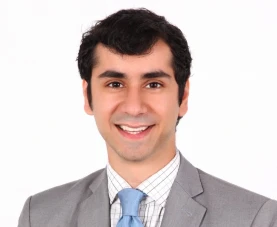3494 - Breaking the Stigma: Oncology Providers Weigh in on Psychedelic-Assisted Therapy
Presenter(s)

A. N. Munjal1, R. Banks1, J. Park2, E. Choi1, M. A. Hoyt3, J. Humphreys4, and J. P. Harris2; 1University of California Irvine, Orange, CA, 2Department of Radiation Oncology, University of California - Irvine, Orange, CA, 3Department of Population Health and Disease Prevention, University of California - Irvine, Irvine, CA, 4University of California San Fransisco, San Fransisco, CA
Purpose/Objective(s): Despite being schedule I drugs, there is
growing interest in psychedelic-assisted therapy, and we wanted to assess oncology provider’s attitudes towards it.Materials/Methods: A cross-sectional survey was conducted among healthcare professionals involved in oncology.
The study was distributed to 5 academic institutions in California, South Carolina, Florida, and 1 nonacademic institution in Georgia. The survey included questions on demographics, familiarity/concerns with psychedelic medications, and case-based scenarios.Results: There were 47 respondents (12% response rate), including 34% medical oncologists. 88% held MD/DO degrees, and 51% practiced in academic settings. Most respondents (57%) were not familiar with the regulatory status of p
silocybin, ketamine, or MDMA. The most common symptoms that providers struggled to manage were depression, physical symptoms of pain, and demoralization. 33% had been asked about psychedelic-assisted therapy, but 88% felt inadequately experienced to guide patients on it. Concerns about recommending psychedelic-assisted therapy were potential oncology treatment interactions and safety issues; key factors encouraging use included well-designed oncology studies and better education on indications. Providers were surveyed on recommending psychedelic-assisted therapy for five cases. For a 76-year-old male with stage IV lung cancer and refractory depression, a 30-year-old male with metastatic sarcoma and a sense of impending doom, and an 85-year-old female with advanced breast cancer and a sense of hopelessness 94% believed they could benefit. For a 77-year-old male with prostate cancer and spiritual suffering 73% thought he could benefit, and for a 65-year-old female with early-stage breast cancer in remission with recurrence anxiety 58% thought she could benefit. On univariate analysis, older patient age, provider specialty, and provider number of patients seen per week were not significant predictors of recommending psychedelic therapy. On multivariate analysis, provider familiarity with specific psychedelics was associated with higher likelihood of recommendation: psilocybin (OR: 1.89, p=0.02), ketamine (OR: 2.15, p=0.004), and MDMA (OR: 1.76, p=0.03). Younger healthcare providers (=40 years) were more likely to recommend (OR= 1.58 p=0.043).Conclusion: In this multi-institutional self-reported study
, one-third of providers have been asked about psychedelic-assisted therapy, but the majority did not feel they could guide patients. Despite its legal status, the vast majority of providers believed some hypothetical patients could benefit from psychedelic-assisted therapy. Willingness to recommend psychedelic-assisted therapy was associated with its familiarity and younger providers. These findings highlight the need for education and additional clinical research to enhance decision-making regarding psychedelic-assisted therapies in oncology.